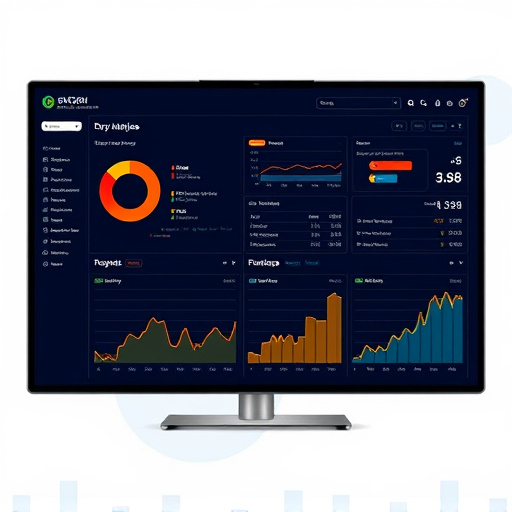Google Search Optimization: Algorithms, Intent, and Quality in 2025

In the ever-changing digital marketing scene, Google search optimization (GSO) remains crucial. Mark…….
In today’s digital age, where information is readily accessible at our fingertips, achieving online visibility has become a paramount priority for businesses, organizations, and individuals alike. At the heart of this quest for visibility lies Google search optimization (GSO), a powerful strategy that ensures your content and website rank prominently in Google search results. This article aims to embark on an extensive journey through the world of GSO, exploring its intricacies, impact, and the vast opportunities it presents. By delving into various aspects, from its technical foundations to global trends and economic implications, readers will gain a comprehensive understanding of why GSO is not just a buzzword but a critical component of digital success.
Google search optimization, in its essence, is the art and science of enhancing a website’s visibility and relevance on Google’s search engine results pages (SERPs). It involves a strategic approach to align web content with the algorithms and preferences of Google’s complex search ranking system. The core components of GSO encompass:
The journey of GSO began with the birth of search engines in the late 1990s. Early search algorithms primarily relied on keyword density and page rank to determine rankings, leading to what was often referred to as ‘black hat’ SEO tactics. As Google emerged as the dominant player, it introduced more sophisticated ranking factors, focusing on user experience and the quality of content.
In 2015, Google’s Core Update revolutionized the industry by implementing a more nuanced understanding of language and context, prioritizing content that provided real value to users. This marked a significant shift towards ‘white hat’ SEO practices, emphasizing relevance, quality, and user intent. Over time, GSO has evolved to keep pace with emerging technologies, such as voice search, mobile-first indexing, and the rise of semantic search, ensuring that websites remain visible and relevant in an ever-changing digital landscape.
Google search optimization is not limited by geographical boundaries; its impact is felt worldwide, shaping how businesses operate and consumers interact with online content.
With Google Search being the most used search engine globally, local businesses and international brands alike must optimize for both broad and targeted audiences. This involves understanding the unique search patterns, languages, and cultural nuances of different regions. For instance, a Japanese e-commerce site may focus on optimizing for specific product-related keywords to cater to local shoppers, while an international travel agency would aim to rank for more general travel terms in multiple languages.
Google search optimization plays a pivotal role in the digital economy, impacting businesses, industries, and national economies worldwide.
The SEO industry has experienced significant growth, attracting substantial investments from both established marketing agencies and emerging startups. According to a report by Market Research Future (MRFR), the global SEO market is projected to reach USD 24.1 billion by 2027, growing at a CAGR of 16.5% during the forecast period (2020-2027). This growth is driven by the increasing demand for online visibility and the need for businesses to compete in a crowded digital marketplace.
GSO offers a high potential ROI when executed effectively. By improving website rankings, relevant traffic can be directed to businesses, leading to increased sales, leads, and brand awareness. A study by BrightEdge found that organic search drives 71% of all website traffic, underscoring the immense economic impact of optimizing for Google.
In the e-commerce sector, GSO is a critical driver of success. Online retailers invest heavily in SEO to attract targeted customers, improve conversion rates, and enhance overall customer experience. Effective GSO strategies can lead to increased sales, improved brand reputation, and a competitive edge over rivals.
Technological innovations have been instrumental in shaping the future of Google search optimization.
AI and machine learning algorithms are at the forefront of GSO advancements. These technologies enable more sophisticated keyword analysis, content understanding, and personalized user experiences. Google’s BERT (Bidirectional Encoder Representations from Transformers) model, for example, has revolutionized natural language processing, allowing search engines to comprehend queries better and deliver more relevant results.
AMP is an open-source project developed by Google to improve the speed of mobile web pages. By creating lightweight, optimized versions of content, websites can enhance user experience and potentially boost rankings on mobile search results. According to Google, sites using AMP have seen up to 90% faster loading times on mobile devices.
Structured data allows search engines to understand the context and meaning behind web content, enabling them to display rich snippets in SERPs. This technology is crucial for businesses looking to stand out from competitors and provide users with quick, valuable information at a glance.
The world of GSO is not without its regulatory considerations, as governments and data protection bodies play a vital role in shaping digital practices.
Data privacy laws, such as the General Data Protection Regulation (GDPR) in Europe, have significant implications for GSO. Websites must obtain user consent for data collection and storage, ensuring transparent practices. This has led to changes in how businesses gather and utilize user information for optimization purposes, with a greater emphasis on user control and security.
Google’s algorithms are largely considered proprietary, but the company provides guidelines and updates through its Webmaster Central blog. While Google maintains transparency about its ranking factors, it carefully balances this with protecting its intellectual property. This dynamic ensures that webmasters stay informed while avoiding black hat practices.
Google has stringent policies against spammy content and practices. Websites found to engage in tactics like keyword stuffing or clickbait can face penalties, leading to lower rankings. Maintaining high-quality, unique content is essential for long-term GSO success.
Despite its numerous benefits, Google search optimization faces several challenges and criticisms.
Google’s regular algorithm updates can cause fluctuations in rankings, creating uncertainty for webmasters. While these updates aim to improve user experience, sudden changes may impact websites that have been optimized effectively. Staying abreast of the latest trends and adapting strategies accordingly is crucial.
As GSO becomes more popular, the competition among businesses to rank for specific keywords increases. This can lead to a saturated market, making it challenging for new websites or small businesses to gain visibility. Innovative strategies and a focus on long-tail keywords can help navigate this challenge.
Some practices, such as keyword stuffing, link farming, and hidden content, are considered black hat SEO and are discouraged by Google. Engaging in these tactics can lead to penalties and damage a website’s reputation. Ethical GSO focuses on providing value to users, ensuring long-term sustainability.
Nike, the global sportswear giant, leveraged GSO to enhance its online presence and drive sales. By conducting thorough keyword research, they targeted specific product-related queries with tailored content and optimized product pages. Additionally, their extensive backlink profile from reputable sports and lifestyle websites further improved their rankings. As a result, Nike experienced a significant increase in organic traffic, leading to higher sales and a more substantial market share worldwide.
A small, family-owned restaurant in a bustling city decided to invest in GSO to compete with larger chains. They focused on local keywords and optimized their website for mobile users. By implementing these strategies, the restaurant saw a substantial rise in online reservations and deliveries, attracting new customers and increasing its overall revenue. This case highlights how GSO can empower local businesses to thrive in a competitive market.
Forbes, a renowned business magazine, utilized GSO to boost its online presence and establish thought leadership. They invested in high-quality content creation, targeting long-tail keywords related to various industries. By consistently delivering valuable insights and analysis, Forbes attracted a vast audience, resulting in increased website traffic and a stronger online brand identity.
The world of Google search optimization is constantly evolving, with new trends shaping the digital landscape.
As voice assistants continue to gain popularity, optimizing content for conversational language will be crucial. This involves incorporating natural language queries and long-tail keywords that users might speak when searching for information.
AI-driven personalization is set to play a more significant role in GSO. By leveraging machine learning algorithms, search engines can deliver highly tailored results based on individual user preferences and behavior. This trend will demand a deeper understanding of user intent and context from content creators.
The next generation of structured data, often referred to as Schema.org 2.0, is expected to introduce more complex markup options. This will enable businesses to provide search engines with even richer information, potentially leading to enhanced snippets, featured snippets, and new types of rich results.
With mobile and voice searches continuing to rise, creating content optimized for these channels will be essential. This includes optimizing for local search, conversational language, and quick answers to user queries.
Google search optimization is a dynamic field that continues to shape the digital destiny of businesses and organizations worldwide. From its technical foundations to global trends and economic implications, GSO is a powerful tool for achieving online visibility and success. As technology advances and user behaviors evolve, those who stay abreast of the latest developments and adapt their strategies will thrive in this ever-changing digital realm.
Q: What are the key metrics to measure Google search optimization success?
A: Key performance indicators (KPIs) include organic traffic growth, keyword rankings, click-through rates (CTRs), average position, bounce rate, and conversion rates.
Q: How does GSO impact local businesses?
A: GSO is crucial for local businesses to compete with larger brands by optimizing for local search results, ensuring they appear at the top of SERPs for nearby customers. This boosts visibility and drives targeted traffic.
Q: Can AI replace human experts in GSO?
A: While AI assists in GSO, it cannot entirely replace human expertise. Human creativity, strategic thinking, and a deep understanding of user behavior are essential for developing effective GSO strategies.
Q: What is the role of data privacy laws in GSO?
A: Data privacy laws, such as GDPR, impact GSO by influencing how websites collect and utilize user data. Compliance with these regulations is necessary to avoid penalties and maintain user trust.
Q: How often should I update my GSO strategy?
A: GSO strategies should be regularly reviewed and updated to keep up with algorithm changes, emerging trends, and shifting user behaviors. Quarterly or bi-annual assessments are common practices to ensure ongoing success.

In the ever-changing digital marketing scene, Google search optimization (GSO) remains crucial. Mark…….

Understanding user intent is crucial for Google search optimization (SEO). Create content that answe…….

Regular Google algorithm updates are crucial for effective modern Google search optimization (SEO)……..

Google search optimization (SEO) focuses on site speed, mobile-friendliness, domain authority, and b…….

Optimizing for Google search optimization (GSO) is key to reducing bounce rates and improving user e…….

Google Search Optimization (GSO) is key for businesses aiming to enhance online visibility and perfo…….

Mastering Google Search Optimization (GSO) involves understanding search engine crawling and indexin…….

Google search optimization (GSO) is crucial for eCommerce success. By optimizing product data, speed…….

Google Search Optimization (GSO) is vital for eCommerce success, improving visibility and user exper…….

Google Search Optimization (GSO) is essential for business growth in the digital era. By optimizing…….